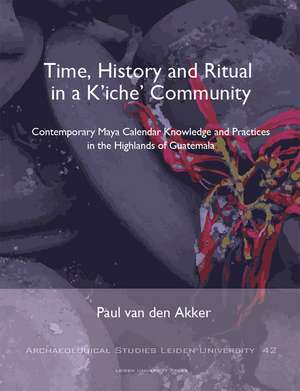Time, History and Ritual in a K′iche′ Community – Contemporary Maya Calendar Knowledge and Practices in the Highlands of Guatemala: Archaeological Studies Leiden University
Autor Paul Van Den Akkeren Limba Engleză Paperback – 30 apr 2018
This work analyzes ritual practices and knowledge related to the Mesoamerican calendar with the aim of contributing to an understanding of the use and conceptualization of this calendar system in the contemporary K’iche’ community of Momostenango in the Highlands of Guatemala. The research presented here discusses the indigenous calendar system, forms of synergy between the Christian and the Highland Guatemalan calendar, the indigenous perception of history, and continuity in time-related symbolism.
Van den Akker argues that the social role of cultural anthropologists and archaeologists is to contribute to the ongoing process of cultural healing and spiritual recovery of the peoples that suffer(ed) from colonization and oppression. This study therefore places an emphasis on cultural continuity and approaches the continuation of Maya calendar practices as a possible tool for restoring breaks in social memory, which are caused by dramatic events such as colonization.
Throughout this book it is argued that time is an authority which directs human behavior in a cyclical manner through the landscape on a local and regional scale. Time is related to morality and cultural values, and a shared perception of time contributes to the cohesion of the community as it recreates and reaffirms the identity of its members by reiterating their shared social conventions and history. Finally, the conjunction of time and ritual provides a tool to overcome the rupture caused by death and to transmit messages from generation to generation over a long span of time.
Van den Akker argues that the social role of cultural anthropologists and archaeologists is to contribute to the ongoing process of cultural healing and spiritual recovery of the peoples that suffer(ed) from colonization and oppression. This study therefore places an emphasis on cultural continuity and approaches the continuation of Maya calendar practices as a possible tool for restoring breaks in social memory, which are caused by dramatic events such as colonization.
Throughout this book it is argued that time is an authority which directs human behavior in a cyclical manner through the landscape on a local and regional scale. Time is related to morality and cultural values, and a shared perception of time contributes to the cohesion of the community as it recreates and reaffirms the identity of its members by reiterating their shared social conventions and history. Finally, the conjunction of time and ritual provides a tool to overcome the rupture caused by death and to transmit messages from generation to generation over a long span of time.
Preț: 363.95 lei
Nou
Puncte Express: 546
Preț estimativ în valută:
69.65€ • 72.27$ • 58.22£
69.65€ • 72.27$ • 58.22£
Carte indisponibilă temporar
Doresc să fiu notificat când acest titlu va fi disponibil:
Se trimite...
Preluare comenzi: 021 569.72.76
Specificații
ISBN-13: 9789087283094
ISBN-10: 9087283091
Pagini: 262
Ilustrații: illustrated in color throughout
Dimensiuni: 210 x 273 x 15 mm
Greutate: 0.84 kg
Editura: AUP – Leiden University Press
Seria Archaeological Studies Leiden University
ISBN-10: 9087283091
Pagini: 262
Ilustrații: illustrated in color throughout
Dimensiuni: 210 x 273 x 15 mm
Greutate: 0.84 kg
Editura: AUP – Leiden University Press
Seria Archaeological Studies Leiden University
Notă biografică
Paul van den Akker is a lecturer in the Department of Art History at the Vrije Universiteit Amsterdam.




